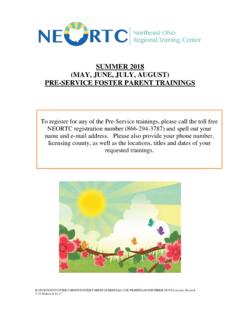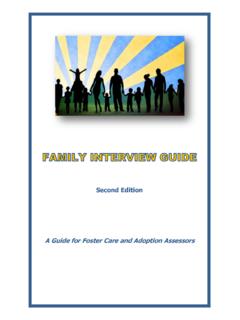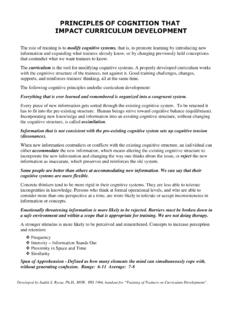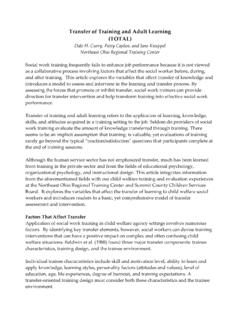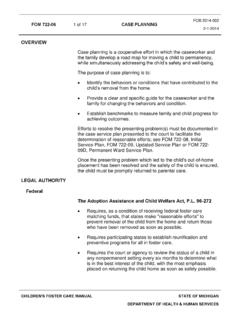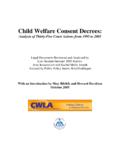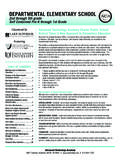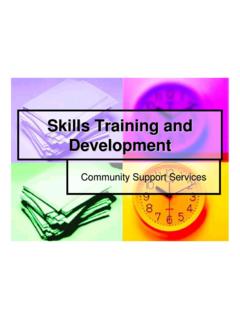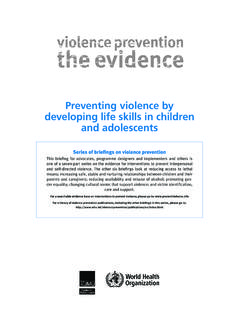Transcription of Primary Family to Foster Family: Understanding …
1 Primary Family to Foster Family Ohio Child Welfare Training Program April 2006 Primary Family to Foster Family : Understanding Challenges, Issues, and Strategies for Success Jayne Schooler, Norma Ginther, Betsy Keefer, Lynn Wilkins Topics and Subtopics (from Classification Table as posted on ) Coaching and Mentoring of Primary Parents Modeling Discipline and Behavior Strategies for Primary Parents Coaching and Mentoring Primary Parents On Caring for Children Openness in Adoption and Foster Care Primary Parents and Kinship Families Visitation Between Foster /Kinship Children and Their Primary Families Competencies Skill Set 924-01: Ability of the caregiver to work with Primary families towards permanency. Comp. No. Competency Description 924-01-001 Knows benefits of working cooperatively with Primary families 924-01-002 Knows types of Family resources and strengths that decrease risk of abuse and neglect 924-01-003 Understands the importance of cultural and ethnic values, norms and practices Knows how to honor these in the caregiving home 924-01-004 Understands the rights of parents whose children are in placement, and knows how to respect those rights 924-01-005 Understands how Primary parents may react to children being removed from their homes and placed in caregiving homes 924-01-006 Understands how positive relationships with Primary families may help them get their children back home.
2 Understands how this may also help Primary parents make another permanency plan for their children 924-01-007 Understands the caregiver's role in working with caseworkers and therapists to help Primary parents have their children returned home 924-01-008 Knows ways to support children s positive feelings toward their birth parents, siblings, and extended Family members 924-01-009 Knows ways to keep Primary parents involved with their children in order to work towards returning children home. Knows how to involve them in making decisions about their children, and providing direct care for them Primary Family to Foster Family Ohio Child Welfare Training Program April 2006 SAMPLE OUTLINE 2-24-09 2 924-01-010 Knows ways to guide and advise Primary parents to safely parent their children 924-01-011 Can recognize birth (or Primary ) families strengths and can talk with children about their parents in a fair, Understanding , and realistic manner 924-01-012 Can work with Primary parents to keep them involved with their children 924-01-013 Can coach Primary parents to improve their parenting so that their children can return home Skill Set 924-02: Ability to support contacts between children and their Primary families.
3 Comp. No. Competency Description 924-02-001 Knows how visits with Primary Family members may affect children and their Family members 924-02-002 Knows how to help plan and arrange visits that can support the child and Primary Family members 924-02-003 Knows how to help children deal with emotional distress resulting from contacts with Primary Family members 924-02-004 Can help prepare the child for contacts with Primary Family members. Can help the child re-adjust to the caregiver's home after contacts Learning Description When a child enters Foster care, that experience can be the most traumatic event of his or her young life, even more than the abuse that led to the removal. The transition from removal to reconnection to reunification (permanency) is a fragile process full of emotion for all who are part of that process.
4 Historically, Foster care was considered a rescuing operation designed to remove children from harmful, abusive, or neglectful homes. However, this traditional role has undergone tremendous change. Foster parents are now expected to facilitate visits and encourage and participate in other forms of interaction between Foster children and their birth families. There is a growing expectation that Foster parents will actively support Primary parents in their reunification efforts. The goal of this workshop is to provide information about why the involvement of Foster caregivers with Primary families is critical for the child and for both families. This training will also enhance skills of Foster caregivers in engaging Primary families, managing conflict, diffusing issues, developing strategies of support, and expediting permanency for children.
5 Primary Family to Foster Family Ohio Child Welfare Training Program April 2006 SAMPLE OUTLINE 2-24-09 3 Learning Objectives: To identify challenges and obstacles in working with the Primary Family To develop an Understanding of the importance of Primary Family inclusion and its impact on children in care To review the developmental stages of Foster Family development and to relate those stages to how Foster families work with the Primary Family To provide an opportunity for the Foster Family to experience the removal of a child and the challenges of reunification To gain Understanding on the types of conflicts that interfere in working with birth parents and to develop strategies on dealing with those conflicts To gain insight into the benefits and liabilities of working with the birth parents and other members of the team.
6 And to develop specific methods of support Methodology Group activities Lecturettes/discussions Video with discussion Cultural Issues The workshop will explore changing values in child welfare and their impact on group cohesiveness. Participants will also learn about the importance of birth Family in the development of child s sense of identity and dispel some stereotypes about birth families. Agenda I. Introductions II. Professional Development of Foster Families III. Gaining Understanding IV. Dealing with Conflicts and Identifying Behaviors V. Working with Primary Families VI. Closing and Evaluation Outline I. Introduction and Setting the Stage Large group activity: Introductions, share What is my greatest concern (or hurdle) in working with birth parents?
7 Primary Family to Foster Family Ohio Child Welfare Training Program April 2006 SAMPLE OUTLINE 2-24-09 4 Lecturette: Role of the Foster caregiver and how it has evolved; Review goals of the learning Experiential activity on severing connections: From the Eyes of a Child Trainees identify connections and then must severe the connection. Trainer prepares group for the activity and lets them know they do not have to participate. TOL: Essential Connections Activity (handout #2) My thoughts, feelings, or insights following this exercise regarding separation for children II. Professional Development of Foster Families as It Relates to Working with the Primary Family Lecturette: Review of Principles of Professional development; The Continuum of Foster Family Developmental Stages Small group activity: Perceptions of Foster Parent Role.
8 Trainees will identify which caregiver activities occur during each of the developmental stages of caregiver TOL: Trainer asks trainees to consider: In which stage would you place yourself? What Understanding did you gain from this exercise? Looking at some of the roles in the next, which presents your greatest challenge or concern? III. Gaining Understanding Small group activity: Handy Dandy Build a Family - Trainees build a Family and recognize all families can find themselves in circumstances that negatively impact their parenting skills. Lecturette: feelings of children IV. Dealing with Conflicts and Identifying Behaviors Lecturette/large group discussion: sources of conflicts for each team member ( Foster Family , caseworker, Primary Family , child) Small group activity: trainees identify sources of conflict, then identify what you might see and hear from someone dealing with the conflict.
9 TOL: thought provoking questions to allow trainees to explore what conflicts they might experience and how they might deal with them. V. Working with Primary Families Small group activity: brainstorming benefits and liabilities, share examples Video: Family Forever: Family Reunification Primary Family to Foster Family Ohio Child Welfare Training Program April 2006 SAMPLE OUTLINE 2-24-09 5 TOL: Thought provoking questions to help trainees identify their preconceived notions about birth families and examine their accuracy. Lecturette: Specific Methods How to Work with the Primary Family : Lightning round activity: trainees identify activities for working with Primary families within each of four categories (helping, supporting, teaching, participating) Small Group activity Smith Case Study. Groups are assigned at point in time (pre-placement, in placement, pre-unification, post-unification) and respond to questions re: how they can work with the Family .
10 VI. Closing and Evaluation TOL: summary questions: a. What was the hurdle you identified this morning in working with the Primary Family ? b. What are three things you will take from this workshop that helped you with that hurdle? Bibliography Balleu, Julius; Hodenfield, Robert; and Overberger, Carla. Handy Dandy Build a Family Kit developed for the Project CFAFT training program from the School of Social Work, University of Michigan. No date available. Holder, W. Essential Connections Exercise, Interdependent Living Curriculum. Kufeldt, K., & Armstrong, J. (May/June 1995). How children in care view their own and their Foster families: A research study, Child Welfare, Vol. 74, (3). Loar, L. (January 1998). Making visits work, Child Welfare, Vol. 77, (1). Sanchirico, A., & Jablonka, K. (June 2000). Keeping Foster children connected to their biological parents: The impact of Foster parent training and support, Child and Adolescent Social Work Journal, Vol.
